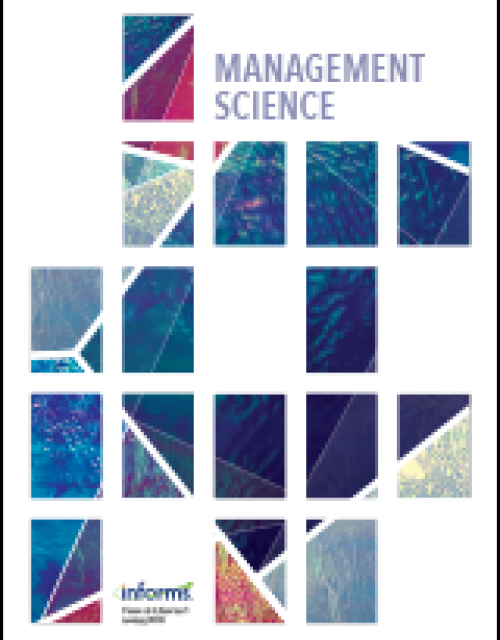Publication records
Subject(s)
Information technology and systems; Unspecified
Keyword(s)
misinformation, disinformation, fake news, user intervention, countermeasure, media literacy
ISSN (Online)
1362-3001
ISSN (Print)
0144-929X
Subject(s)
Information technology and systems; Management sciences, decision sciences and quantitative methods; Marketing; Technology, R&D management
Keyword(s)
information design, bayesian persuasion, costly information acquisition, pilot tests,
product reviews
product reviews
We consider the information design problem of a demand-maximizing firm launching a product of unknown quality to a market consisting of customers who have heterogeneous prior beliefs about quality. The firm publicly discloses information about quality to all customers. These customers can subsequently opt to acquire additional information about the product at a cost from sources beyond the firm's control. Our study is motivated by the common practice of firms conducting public pilot tests or soliciting reviews from opinion leaders before launching a new product to inform potential customers about its quality. To analyze this problem, we construct a game-theoretic model of Bayesian persuasion between the firm and its customers. We characterize the firm's optimal information policy and show that it can range from fully disclosing quality to exaggerating or downplaying quality to not disclosing quality at all depending on market characteristics. We delineate the impact of market heterogeneity and access to additional information on the optimal information disclosure policy of the firm. Our analysis provides managerial guidance for firms in designing information provision strategies and operationalizing them for different market characteristics.
© 2024 John Wiley & Sons, Ltd.
Subject(s)
Economics, politics and business environment
Keyword(s)
Market Power, Search and Matching, Wages
JEL Code(s)
J31, J42
Subject(s)
Economics, politics and business environment; Ethics and social responsibility; Human resources management/organizational behavior; Management sciences, decision sciences and quantitative methods
Keyword(s)
misinformation, fake news, morality, fuzzy-trace theory, gist, verbatim, partisan politics
Volume
57
Journal Pages
101788
Subject(s)
Information technology and systems; Management sciences, decision sciences and quantitative methods; Technology, R&D management
Keyword(s)
information design, supply chain management, newsvendor model, forecast sharing
ISSN (Online)
1526-5501
ISSN (Print)
0025–1909
Subject(s)
Information technology and systems; Technology, R&D management
Keyword(s)
information technology, IT security law, cybersecurity, European regulation
Volume
52
Journal Pages
105927
ISSN (Online)
1873-6734
ISSN (Print)
0267-3649
Subject(s)
Economics, politics and business environment
Keyword(s)
Trade platform, hybrid business model, antitrust policy, tax policy
JEL Code(s)
D42, L12, L13, L40, H25
We provide a canonical and tractable model of a trade platform enabling buyers and sellers to transact. The platform charges a percentage fee on third-party product sales and decides whether to be "hybrid", like Amazon, by selling its own product. It thereby controls the number of differentiated products (variety) it hosts and their prices. Using the mixed market demand system, we capture interactions between monopolistically competitive sellers and a sizeable platform product. Using long-run aggregative games with free entry, we endogenize seller participation through an aggregate variable manipulated by the platform's fee. We show that a higher quality (or lower cost) of the platform's product increases its market share and the seller fee, and lowers consumer surplus. Banning hybrid mode benefits consumers. The hybrid platform might favor its product and debase third-party products if the own product advantage is sufficiently high. We also provide some tax policy implications.
Subject(s)
Information technology and systems; Management sciences, decision sciences and quantitative methods; Technology, R&D management
Keyword(s)
machine accuracy, decision making, human-in-the-loop, algorithm aversion, dynamic learning
Artificial intelligence systems are increasingly demonstrating their capacity to make better predictions than human experts. Yet, recent studies suggest that professionals sometimes doubt the quality of these systems and overrule machine based prescriptions. This paper explores the extent to which a decision maker (DM) supervising a machine to make high-stake decisions can properly assess whether the machine produces better recommendations. To that end, we study a set-up in which a machine performs repeated decision tasks (e.g., whether to perform a biopsy) under the DM’s supervision. Because stakes are high, the DM primarily focuses on making the best choice for the task at hand. Nonetheless, as the DM observes the correctness of the machine’s prescriptions across tasks, she updates her belief about the machine. However, the DM is subject to a so-called verification bias such that the DM verifies the machine’s correctness and updates her belief accordingly only if she ultimately decides to act on the task. In this set-up, we characterize the evolution of the DM’s belief and overruling decisions over time. We identify situations under which the DM hesitates forever whether the machine is better, i.e., she never fully ignores but regularly overrules it. Moreover, the DM sometimes wrongly believes with positive probability that the machine is better. We fully characterize the conditions under which these learning failures occur and explore how mistrusting the machine affects them. These findings provide a novel explanation for human-machine complementarity and suggest guidelines on the decision to fully adopt or reject a machine.
© 2023, INFORMS
ISSN (Online)
1526-5501
ISSN (Print)
0025–1909
Subject(s)
Strategy and general management; Technology, R&D management
Keyword(s)
alliance termination; disintegration, innovation strategy, open innovation closure, relationship dissolution, tie dissolution
ISSN (Online)
2688-2639
ISSN (Print)
2688-2612
Subject(s)
Finance, accounting and corporate governance
Keyword(s)
Tax avoidance, tax burden, tax incidence
JEL Code(s)
H20, H25
ISSN (Online)
1911-3846
ISSN (Print)
0823-9150
